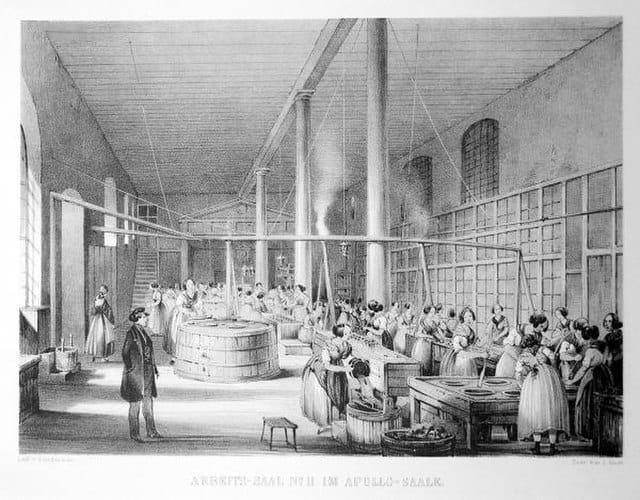Work Against the Poor
On Elizabeth Anderson's Hijacked: How Neoliberalism Turned the Work Ethic Against Workers and How Workers Can Take It Back

Though the earth, and all inferior creatures, be common to all men, yet every man has a property in his own person: this nobody has any right to but himself. The labour of his body, and the work of his hands, we may say, are properly his. Whatsoever then he removes out of the state that nature hath provided, and left it in, he hath mixed his labour with, and joined to it something that is his own, and thereby makes it his property. It being by him removed from the common state nature hath placed it in, it hath by this labour something annexed to it, that excludes the common right of other men: for this labour being the unquestionable property of the labourer, no man but he can have a right to what that is once joined to, at least where there is enough, and as good, left in common for others. - John Locke, Second Treatise of Government
Work hard, don’t do drugs, stay in school, work even harder after you graduate, and the good things in life will be yours. So runs the sensible advice millions of parents give their children year in and year out while bracing to see how many creative ways they’ll ignore it. Beyond just serving as a comforting platitude, mom and dad’s mantra reflects the abiding fixation on the “work ethic” which has perennially transfixed much of the Anglo-American world. This takes many different forms. Many of us celebrate the mythology of the self-made man who became independently successful through hard work and talent; so much so that those who present themselves as self-made can become violent when the pretension is challenged. Even a trust fund child like Donald Trump felt compelled to gesture to the mythology. While characterizing himself as part of the “lucky sperm club” Trump has always stressed how it was ultimately his talent and business savvy that led him to the auspicious heights of the Apprentice and Stormy Daniels scandals.
But the ethical fixation on work also has a dark side, with the poor and unfortunate enduring not just material deprivation but very often the blame for their own condition while being told there is nothing socially or politically to be done about their plight. From political economist Thomas Malthus’s gloomy insistence in the 18th century that poverty was often the result of indolence and sexual license on the part of the poor to businessman Tim Gurner denouncing in the 21st century the “arrogance” of a lazy working classes that doesn’t recognize what a privilege it is to work for the boss, the examples are many and timeless.
In her new book Hijacked: How Neoliberalism Turned the Work Ethic Against Workers and How Workers Can Take It Back the incomparable Elizabeth Anderson offers us a history of the work ethic and its influence. This is familiar territory for Anderson, who has made important contributions to liberal egalitarian political theory for decades and recently published the controversial Private Government: How Employers Rule Our Lives (And Why We Don’t Talk About It). The latter book was largely about various forms of domination and hardship in the 21st century workplace, but Hijacked is much more ambitious. It is nothing less than a systematic chronicle of epic battles over the meaning of the work ethic between partisans of the rich and poor. Anderson concludes that the rich have been winning for a long time now.
You Better Work
Anderson opens her book with the familiar post-Weberian observation that for
the vast majority of history, people have regarded work as a curse. The Bible says so (Gen. 3:19). Work was what people were forced to do. Those with means chose leisure. The Catholic Church in the Middle Ages did not particularly extol the value of work. It proclaimed numerous holidays. It praised giving alms to beggars. It created several orders of mendicant friars, who survived on begging. The republican tradition inherited from ancient Greece and Rome also valued leisure over work. Leisure was the domain of free citizens. Labor was what slaves and menial servants did.
Echoes of this persist to this day, with many projecting vast and unrealistic dreams onto an ever-receding retirement, ranging from a variable number of margaritas on an invariably warm beach to finally taking a crack at a hobby once read about and never quite gotten to. The early parts of Hijacked explain how we transitioned from a culture that venerated leisure (and still sometimes does) to one that made work not just a natural but an ethical priority.
Following auspicious past commentators like Weber and R.H. Tawney, Anderson locates the root of the contemporary “work ethic” in the Protestant Reformation. Eschewing the ostentatious ceremony of Catholicism, Protestant reformers from Luther to Calvin to Richard Baxter foregrounded the importance of the individual’s personal relationship with God, which could be improved or demonstrated through a strict willingness to do one’s duty. In Anderson’s telling, many of these new theologies had an almost Spartan quality to them, requiring abstention and discipline and imposing stern and ruthlessly internalized judgements on those who fail to live up to their demands. In some hands this could be readily turned on the poor, as when the great theological revolutionary Martin Luther condemned the peasant revolts and demanded the German princes step in to preserve law, order, and hierarchy. But Anderson breaks new ground by defending aspects of the typically castigated “Protestant work ethic.” She points out how it could have an egalitarian quality, uplifting “even the lowliest worker by sacralizing ordinary work and repudiating the idea that any particular calling—even the priesthood—is superior.” This could even translate into fiery political action, with Puritans like Richard Baxter condemning the idle rich and aristocrats for exploiting the poor and reaping where they had not sown.
For Anderson, the contradictory ways the work ethic has been mobilized stamp its ongoing history. Much of the book is taken up by contrasting “progressive” versus “conservative” interpretations of the work ethic by a wide array of political theorists. Generally, progressives have followed in Baxter’s footsteps by stressing the contributions of the poor and marginalized, demanding they get a larger share of the riches they produced and denouncing the wealthy for expropriating them. Conservatives by contrast would deploy the work ethic in a variety of inconsistent ways. At points they would defend the superior efforts of the rich, and even turn around the progressive accusation to accuse the poor and marginalized of being lazy, drunken, selfish and greedy. In other moments some conservatives would acknowledge the comparative idleness and luxury of the rich, but excuse it as the necessary price for higher forms of civilization and cultural achievement.
What makes her chronicle original is Anderson’s remarkable ability to reintroduce a variety of both well-known and (undeservedly) all but forgotten figures while telling her story. In her hands Locke, for many of us the foundational figure of the “conservative” interpretation of the work ethic, was often a radical progressive. She reminds us that, while Locke did insist that the world belonged to the “industrious” and “rational,” he often had ordinary people in mind rather than the aristocratic riche. Anderson also foregrounds how Locke, despite his reputation as the arch-capitalist, defended redistributive policies in his own time and insisted that in the state of nature one could create property through labor but must leave “enough, and as good” for everyone else. This is a creative reinterpretation of Locke as a progressive that warrants careful reflection. But Anderson also acknowledges that at other points in his career, Locke could show an unnerving
readiness to think the worst of the unemployed poor, to close his heart to more generous treatment, to prescribe punitive treatment to correct their vices, to pretend that this benefits them, to exploit their labor for other’s profit, to stunt their development so that they are fit only for a life of drudgery, to subject them to a harsh authoritarian regime: here are the seeds of the dictatorship of the bourgeoisie.
Anderson approaches other advocates of the “progressive” work ethic with similar balance. Anderson praises J.S. Mill for his defense of workplace cooperatives and emphasis on securing economic flourishing for all, but rightly chastises him for his racist defense of paternalistic imperialism. In an important chapter, Anderson discusses Marx’s complex thoughts on the work ethic, alienation, and democracy. She rightly rejects the idea of a socialist command economy and admonishes Marx for his occasional statism, but praises his proximity to the progressive liberal tradition, his defense of a “democratic path for worker’s emancipation,” and his “broadly Aristotelian” conception of human flourishing. Most importantly, Anderson spends a considerable amount of time reconstructing social democratic political theory, using the almost forgotten work of Eduard Bernstein, especially his magnum opus Evolutionary Socialism. Going beyond scholarly exegesis, Anderson’s foregrounding of Bernstein is intended to help reestablish intellectual defenses of social democracy and egalitarian liberalism by situating them in a longer and prestigious history.
Hijacking the work ethic
Anderson’s book will likely be controversial for its truly acerbic treatment of defenders of the “conservative work ethic,” from Burke through Malthus and on to neoliberalism. Each of these figures appealed to elitist conceptions of the work ethic to insist the poor had no right to demand anything of hard working elites, or even to ironically denounce the poor as greedy and oppressive. There is a palpable sense of righteous anger that gives Hijacked a sense of moral purpose and contemporaneity that is (ironically) quite rare in works of political theory, but will surely outrage the right. Denouncing Burke’s “aristocratic paternalism” she points out how the esteemed critic of abstract reason and dogmatism himself “eagerly resorted to abstract, dogmatic principles of reason” when engaging in a “diatribe” against efforts to redistribute wealth to the poor during the famines of the 1790s. He insisted that labor must be treated like a commodity because it was “in the nature of things” and denounced efforts to redistribute to the poor as “plunder” and the “poor rising to destroy the rich.”
In another twist, much like Anderson is surprisingly defensive of Locke she is startlingly critical of Jeremy Bentham. Bentham is often regarded as the great champion of reform, reason, and equality in analytical political thought. After all, the basis of his utilitarian theory was to dismiss all aristocratic claims that some are more entitled to happiness or consideration than others. In the hedonic calculus, “each person is to count for one, and no one for more than one.” And yet Anderson shows how Bentham’s outlook was nonetheless profoundly shaped by his own thinly disavowed prejudices, as demonstrated by the vividly authoritarian nature of some of his anti-poverty proposals. The immense, privately managed panoptical workhouses where the poor, including child laborers, would be sent are a case in point. Inmates would be denied food until they’d completed their tasks, and would wear wooden clogs and uniforms made of discarded clothing. The effect would be to visibly degrade the inhabitants of the workhouses. They would have no privacy, and be continuously policed to ensure good behavior and maximal productivity.
This chapter would be improved by a longer discussion of how Bentham’s sinister panoptical utilitarianism developed into the liberal socialist humanism of Mill or the effective altruism of Peter Singer. But it goes some way to explaining how an egalitarian moral and political theory like utilitarianism could serve as the basis for a profoundly non-egalitarian social order. This is important in understanding how a kind of utilitarianism would be attractive to neoliberal critics of the welfare state, such as Ludwig von Mises and Milton Friedman. Utilitarianism has always been torn between what Henry Sidgwick called “rational hedonism” and “rational benevolence”—the tension being between insisting that all human beings seek individual pleasure for themselves while also claiming that they should put aside private gratification where necessary to secure the greatest happiness for the greatest number. For many utilitarians following Bentham, “rational hedonism” was simply weighted more heavily than requiring a commitment to “rational benevolence” in any immediate sense. Instead the tension between rational hedonism and rational benevolence was resolved by insisting that, in a market society, each person working hard to pursue their private gratification would inadvertently benefit everyone else.
What was little appreciated was how easily this could in turn be weaponized against the poor, with the least well off being characterized as “unproductive” and “non-contributing” members of society who were not only failing their private task of achieving self-gratification but also reneging on their social duty to successfully sell their labor on the open market. Beneath the sometimes coldly delivered intonations on the “welfare state” delivered by neoliberal utilitarians, Anderson detects echoes of Bentham’s scorn for the perceived idleness and wastefulness of the very poor who should have been his first concern.
Conclusion
For various Rawlsian reasons I am not entirely convinced by Anderson’s defense of the “progressive work ethic” in Hijacked. This is somewhat odd to say given how Anderson was Rawls’s student, and his liberal egalitarian outlook has undoubtedly shaped her own. The problem I have with any moral arguments based on the “work ethic” is the extent to which they still cede a great deal to the notion that there are deserving and undeserving people, and that this can be evaluated based on their efforts or contribution. Of course Anderson doesn’t build her claim on the basis of their being more deserving or undeserving people—only that the idle and exploitative rich don’t deserve to exercise various forms of private tyranny over the rest of society. While the idea is no doubt powerful, as Anderson shows with great clarity, it strikes me as analytically problematic to turn the work ethic against the rich—even if I have a great deal of sympathy for the position. Once one appreciates the moral arbitrariness at work in life, including the extent to which our natural talents and propensity to work are a matter of circumstances largely beyond our powers, the argument that rewards should follow work seems empty. There is even some cross-ideological agreement on this point. As Michael Sandel points out in his recent The Tyranny of Merit, both Rawls and F.A. Hayek were united in rejecting arguments from labor or the work ethic in their political theories. That Hayek, the patron saint of neoliberal theory, would take this step suggests a complication in the story Anderson is attempting to tell about how a conservative version of the work ethic underwrites the woes we are experiencing now.
Nevertheless Hijacked is an excellent book and Anderson’s richest so far. Its creativity and forcefulness in reconstructing the history of modern political thought is beyond dispute, as is the power of the story of decline and fall she traces. Most importantly Anderson holds out the specter of a better, social democratic world that was and could be again if we rediscover its basic principles. That’s an inspiring message, and one that deserves receptive listeners.
Featured image is Lithographie des Arbeitssaales Nr. 2 der nach dem Apollo-Saal benannten Apollo-Kerzenfabrik in der Zieglergasse im 7. Bezirk in Wien.




